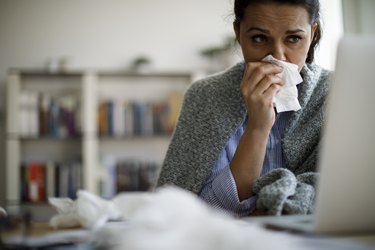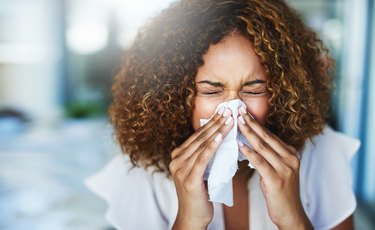
Nosebleeds: Terrifying the first time you get one, and equally as concerning when you get them frequently.
"The nose is very rich in blood supply," Jose Ruiz, MD, an otolaryngologist with the University of Miami Health System, tells LIVESTRONG.com.
Video of the Day
Video of the Day
That makes it sensitive to a whole host of things, including trauma (think: blowing too hard into that tissue) but also less obvious things like dry air. In other words, there are many causes of nosebleeds, including the relatively benign and the more worrisome.
Here's what might be causing your bloody nose, and what you can do about it.
1. Your Nose Doesn't Like the Cold
Winter and early spring mean dry, hot indoor air and cold, dry outside air — a perfect moisture-sapping combination.
"Just like your lips get chapped, the nose can get dry, crack and bleed," Dr. Ruiz says. (The summer poses its own challenges with air conditioners and fans similarly dehydrating nasal passages.)
The fix: Boost moisture in the nose with a topical saline gel. Dr. Ruiz recommends AYR Saline Nasal Gel, available on Amazon ($3.39). Pro tip: Buy it with your HSA/FSA dollars!
2. You’re Messing With Your Nose Too Much
Aggressive nose-blowing during colds and allergy attacks, and "digital trauma" (really) from sticking your finger up your nose for any reason can increase the likelihood you'll bleed from your nose.
Most often, Dr. Ruiz says, this will look like blood-tinged mucous on the tissue rather than a full-on bleed.
The fix: Figure out the why behind what you’re doing here. If you have allergies, then you’ll want to talk to your doctor (ideally a board-certified allergist) about the best way to control your symptoms, whether that’s allergen avoidance, medication or immunotherapy (allergy shots).
Have a cold? There’s nothing you can do to cure it, but you can use supportive care to decrease symptoms with the goal of having to blow your nose less, including drinking fluids and getting enough sleep, according to the U.S. National Library of Medicine. You can also turn to over-the-counter cold and cough medications to ease symptoms. Do be careful with these over-the-counter meds, though, since they can interact with prescription medications.
And if you're just digging for boogers, well, we think you know what to do.
3. It's Allergies

Along with over-blowing your nose during an allergy attack, allergy meds can contribute to nosebleeds by drying out the mouth and nose, Dr. Ruiz says.
"A steroid nasal spray such as fluticasone (Flonase) is a great treatment for allergies and nasal congestion, but if you use it the wrong way, it can cause nosebleeds," he says. Spraying it up toward the middle of your nose can irritate the septum, leading to bleeding.
The fix: Learn how to use these sprays correctly:
- Keep your head upright.
- Using the opposite hand for the opposite side of the nose, aim the spray straight back (and away from the septum).
- Breathe in slowly as you spray.
4. It May Be Your Medication
Some medications can make you more prone to bleeding, like blood thinners, including aspirin, coumadin (Warfarin), clopidogrel (Plavix) and rivaroxaban (Xarelto), Dr. Ruiz says.
The fix: If you’ve recently started a medication and are noticing more nosebleeds, call your doctor to discuss how to properly address these side effects.
5. There's a Small Chance You Have a Blood Vessel or Bleeding Disorder
These are rarer contributors to nosebleeds, but worth knowing about.
A condition called hereditary hemorrhagic telangiectasia (HHT) is when some blood vessels do not develop properly, leaving you prone to bleeding, according to the Centers for Disease Control and Prevention (CDC). Nosebleeds are the most common sign of this genetic disorder, and they often start in mid-life, Dr. Ruiz says.
If you have HHT, your children each have a 50 percent chance of having it too, so it's important to make them aware of this possibility. Their doctor should also be told if you are diagnosed with HHT.
Another possibility is hemophilia, an inherited bleeding disorder where the blood doesn't clot properly, notes the CDC. This disorder runs in families, though not every family knows if theirs is affected. Frequent and hard-to-stop nosebleeds is one sign, along with joint pain and swelling, blood in the urine or stool and bruises called hematomas, notes the CDC.
The fix: See your doctor for a proper diagnosis, which is done through blood testing. Your doc can also help with a treatment plan.
How to Stop a Nosebleed
There are three steps Dr. Ruiz recommends:
1. Pinch Your Nose
Using your thumb and index finger, pinch the area close to the base of your nose (this is the soft, not bony, part). Hold for 10 to 15 minutes. Sit and watch TV to pass the time, but don't let go to check how things are going. Let go prematurely and you may not allot enough time to clot, which will prolong the process.
Tip
Avoid tipping your head back — swallowing blood will likely make you nauseous.
2. Use a Nasal Spray
If you get nosebleeds often, keep Afrin around. It's a nasal congestion spray used in the treatment of colds and allergies that has a bonus benefit of taking care of nosebleeds.
"This spray constricts blood vessels to reduce bleeding," Dr. Ruiz says.
Note that this spray is not meant for long-term use. The company website recommends against using it for more than three days, as prolonged use can cause rebound congestion.
3. Apply Ice
Wrap ice in a paper towel and apply to your nose, which will also help constrict blood vessels.
When to See a Doctor for a Nosebleed
The overwhelming majority of time, the three things above will be enough to stop a nosebleed. If not, go to urgent care or the ER.
One note: At urgent care, they may put packing in your nose and give you an antibiotic. However, do not put packing or a cotton roll in your nose to treat it on your own. Doing so can put you at risk for developing an infection, Dr. Ruiz says.
Regular nosebleeds that come from one side and last 5 to 10 minutes may need additional treatment. In that case, your doctor may recommend a procedure where they cauterize, or seal up, the blood vessel.
Is this an emergency? If you are experiencing serious medical symptoms, please see the National Library of Medicine’s list of signs you need emergency medical attention or call 911.